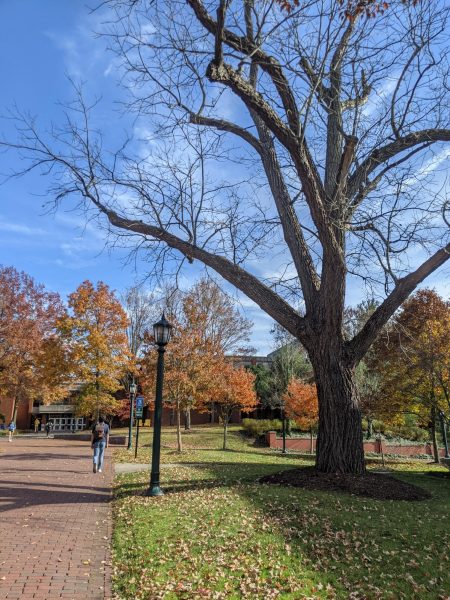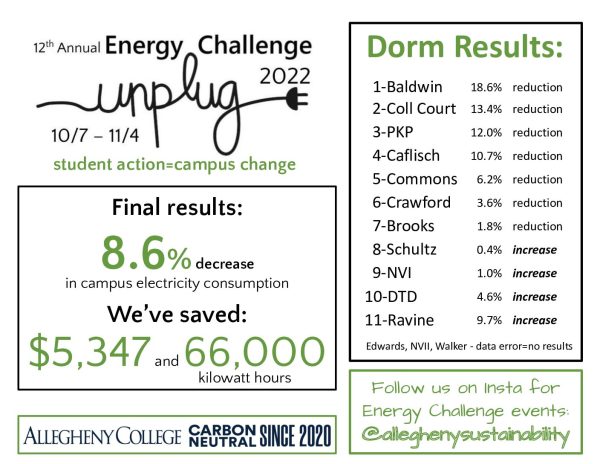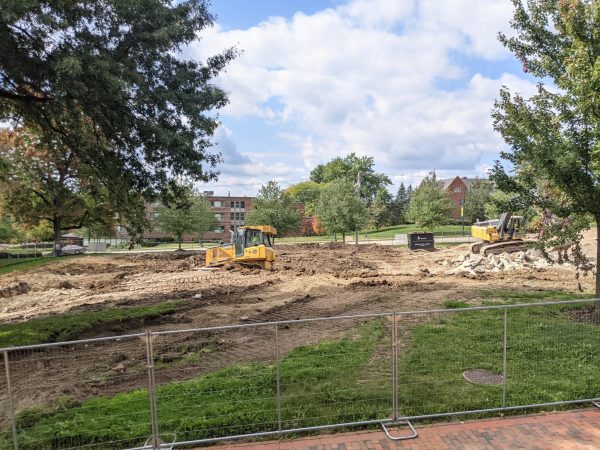Recycling: Global markets, local efforts
A can resting in an otherwise empty blue recycling bin must feel lonely. As the can ponders its existence and recalls being the chosen beverage among a sea of other brightly colored cans, others gather in the blue bin — some plastic bottles and a paper exam, along with its owner’s shame. As the blue bin fills, a recycling journey begins.
“Recycling is marketed to us as this great environmentalist thing,” said Kelly Boulton, ’02, Allegheny College’s sustainability coordinator. “The reality is that recycling is very market-driven, so it’s very based on capitalism. The only reason that recycling functions is because there is a market for selling those products.”
While recycling can be good, Boulton said, market forces should not be ignored. The model of recycling as a market-driven system has recently attracted global and local attention.
On July 18, 2017, the Ministry of Environmental Protection of the People’s Republic of China submitted an official notification to the World Trade Organization stating it would no longer import certain types of solid waste, including some plastics, unsorted paper and vanadium slag, a waste product of metal alloy production.
Several Chinese groups, including the Ministry of Environmental Protection, Ministry of Public Security and the General Administration of Customs, stated reasons for the import restrictions, which, according to the notification, was to be implemented by the end of 2017.
“We found that large amounts of dirty wastes or even hazardous wastes are mixed in the solid waste that can be used as raw materials. This polluted China’s environment seriously,” the notification reads in part. “To protect China’s environmental interests and people’s health, we urgently adjust the imported solid wastes list, and forbid the import of solid wastes that are highly polluted.”
WTO members — including the United States, Australia and South Korea — expressed concern about the notification at an Oct. 3, 2017, meeting of the WTO Committee on Import Licensing, which resulted in delegation from China planning to return to its leaders and direct concerns to them.
Robin Wiener, president of the District of Columbia-based Institute of Scrap Recycling Industries, issued a statement about China’s notification in July, the same day the notification was submitted to the WTO.
“If implemented, a ban on scrap imports will result in the loss of tens of thousands of jobs and closure of many recycling businesses throughout the United States,” the statement reads.
Because of the global scope of recyclables, their transport and their role in creating new products, recycling markets in some countries have been disturbed. The New York Times reported on Jan. 11 that Canada and many European nations are now unsure about where to send their recyclable waste and what future recycling markets will hold.
A separate notification from the Standardization Administration of China to the WTO in November has also shifted the recyclables market.
The November notification describes plans to decrease the level of contaminants allowed in imported recyclables. Contamination refers to any non-recyclable product or material being discarded among recyclables. For instance, a plastic grocery bag, which is not recyclable in most places, discarded in a recycling bin risks contamination of the bin’s recyclable materials during compacting and breakdown processes.
Impacts of the contaminant threshold change may have reached Meadville, as the Crawford County Solid Waste Authority’s community blue bin program ended in December.
“The global market for recycling is changing drastically,” said Brenda Schmidt, Crawford County recycling coordinator and Crawford County Solid Waste Authority director.
The blue bin program provided recycling for residents at eight sites in Crawford County, and the authority attributes the program termination in part to “a new financial penalty for contaminated materials in the bins” and “a drop in the commodity price of recyclables,” according to a Dec. 21, 2017, Meadville Tribune article.
Waste Management, which hauled the blue bin recyclables for the authority, would have incurred a $200 fine for each contaminated load, an infeasible cost for the authority’s 2018 budget issued by the county, the Tribune article explains.
The authority requested $200,000 from the county for 2018, but received $150,000, according to Gloria Shields, a Crawford County Solid Waste Authority board member.
Shields said the authority also receives grant funding from the state, and Waste Management had offered the lowest price for processing the recyclables, but because of the $50,000 reduction and the contamination fines, the blue bin program was no longer cost-effective.
Shields said she thinks the Waste Management contamination fine reflects the business pressures associated with China’s new contamination standards, expected to be enacted in March of this year.
“It became not efficient and not cost-effective, but there is hope for the future,” Shields said. “I think what the Solid Waste Authority is going to do is advise municipalities on how to write good contracts. We hope that municipalities will be able to offer — through a contract — trash and recycling management for their residents.”
Shields said having a contract for recycling in townships is important because such contracts are generally less expensive for residents than individual management plans. Meadville and Titusville are the only cities in Crawford County mandated to recycle, according to Shields and Schmidt.
Monthly authority meetings are open to the public, and the next meeting will take place on Feb. 8 at 4 p.m. at the Extension Office at 1099 Morgan Village Road, Meadville, Pennsylvania, Shields said.
Allegheny has also made efforts to recycle waste, and Waste Management currently serves the college campus as its provider for recycling collection, according to Physical Plant Director Cliff Willis.
Willis said a contract between the college and Tri-County Industries ended in 2016, and the college entered into a new contract with Waste Management in June 2016.
The college accepted proposals from both Tri-County Industries and Waste Management and selected Waste Management based on a competitive pricing analysis, according to Willis. After nearly two years of contracting with Waste Management, Willis said he thinks the contract has generally been going well.
“We’ve had a few glitches here and there, but you’ll have that with any contract,” Willis said. “Waste Management provides good service and we’re paying a lot less than we used to.”
The contract involves recycling collection by Waste Management at the college’s recycling compactor located at the Robertson Athletic Complex.
Once bins are full of cans, bottles and regrettable exams, teams of St. Moritz employees — under the college’s housekeeping contract — collect recycling from campus buildings and residence halls and transport them to the compactor.
The compactor flattens the recyclables so they can be more efficiently transported to a Waste Management facility in Neville Township, Pennsylvania, outside of Pittsburgh, according to Don Klippel, Physical Plant facilities operations lead.
With a single-stream recycling model, all recyclable materials enter the compactor and are transported together to the Waste Management facility where materials are sorted, so different types of recyclable materials can be discarded in the same bin, Boulton explained.
Collection bins in academic buildings or the Henderson Campus Center with colored lids and cut-outs for specific materials like paper or plastic bottles do not maintain a separation from other materials. Paper can be discarded in a bin marked for plastic since both materials will end up in the compactor.
“Something that I’ve been trying to fix across campus is to make all of the labeling consistent,” Boulton said. “It’s a constant battle. I’ll get one building done and then it gets messed up again.”
Campus houses on Meadville city streets also receive single-stream recycling collection, but that collection is managed by the City of Meadville, Boulton said. The current contract for city recyclables is Tri-County Industries, according to Schmidt.
Glass, metal, paper, cardboard and plastics labeled 1–7 are acceptable in campus bins as well as city bins at campus houses, according to the City of Meadville residential refuse and recycling website.
The single-stream model can benefit recyclers in terms of convenience, but recyclers may also experience some confusion with recyclability and compostability. Boulton said some Parkhurst plastics are marked as both compostable and recyclable, and she recommends composting those double-marked items when at McKinley’s Food Court and recycling those items when in academic buildings or residence halls where compost bins are not available.
Boulton said she hopes to improve waste management efforts on campus by implementing a reusable takeout container program at McKinley’s, similar to the program at Brooks Dining Hall.
Boulton also worked with Allegheny Student Government several years ago to bring electronic waste bins to campus. Two bins — one at the entrance to Brooks Dining Hall and one on the second floor of the campus center, across from the post office — serve as collection sites for unwanted cell phones, batteries, light bulbs, CDs, cords and ink cartridges.
Those items are transported to the electronic and hazardous waste collection point in the basement of Steffee Hall and are then collected from Steffee by Environmental Coordination Services and Recycling, headquartered in Cochranton, Pennsylvania.
While recycling does divert waste from landfills — whether battery, cell phone, paper or plastic — and reusing recycled materials reduces the amount of energy and water required to produce goods, recycling does not reduce consumption, according to Eric Pallant, chair of the Environmental Science Department.
“It doesn’t reduce the overall amount of things we consume in our society or at Allegheny,” Pallant said. “Recycling doesn’t really solve the problem. It doesn’t save the environment, at least not nearly as much as the ‘reduce’ part of ‘reduce, reuse, recycle.’”
Boulton also emphasized the importance of reduction.
“Recycling is good, and it’s something that we all should do, but we should also be thinking about how to reduce the amount of waste we have in total, because it’s still trash, it’s still waste,” Boulton said. “It’s great that we can reuse it, but there’s a lot of energy tied up in the reuse of that.”
Even when we work towards reduction, the realities of the recycling market loom, and the full impacts of 2017 changes to global recycling cannot yet be realized.
But colorful cans will continue to fill bins, and those bins will continue to be emptied for compaction and transport. Perhaps a small component of the can you chose last year will meet you again as you make your next choice.









Rick Grimes • Feb 5, 2018 at 8:34 pm
Fifty years ago, I returned glass soda bottles for 2-5 cents each, which was a required deposit at that time. I used that money to purchase a lawn mower, and snow shovel to earn more money. At age 23, I used the money earned to purchase my first rental property.
I may never be a millionaire, but this high school graduate earned enough money to help pay for his daughter’s Allegheny education.
Recycling may not have been my intent, but education was the result. Mine, and hers.
Allegheny College offers a financial literacy course. I hope it has a wait list for students.